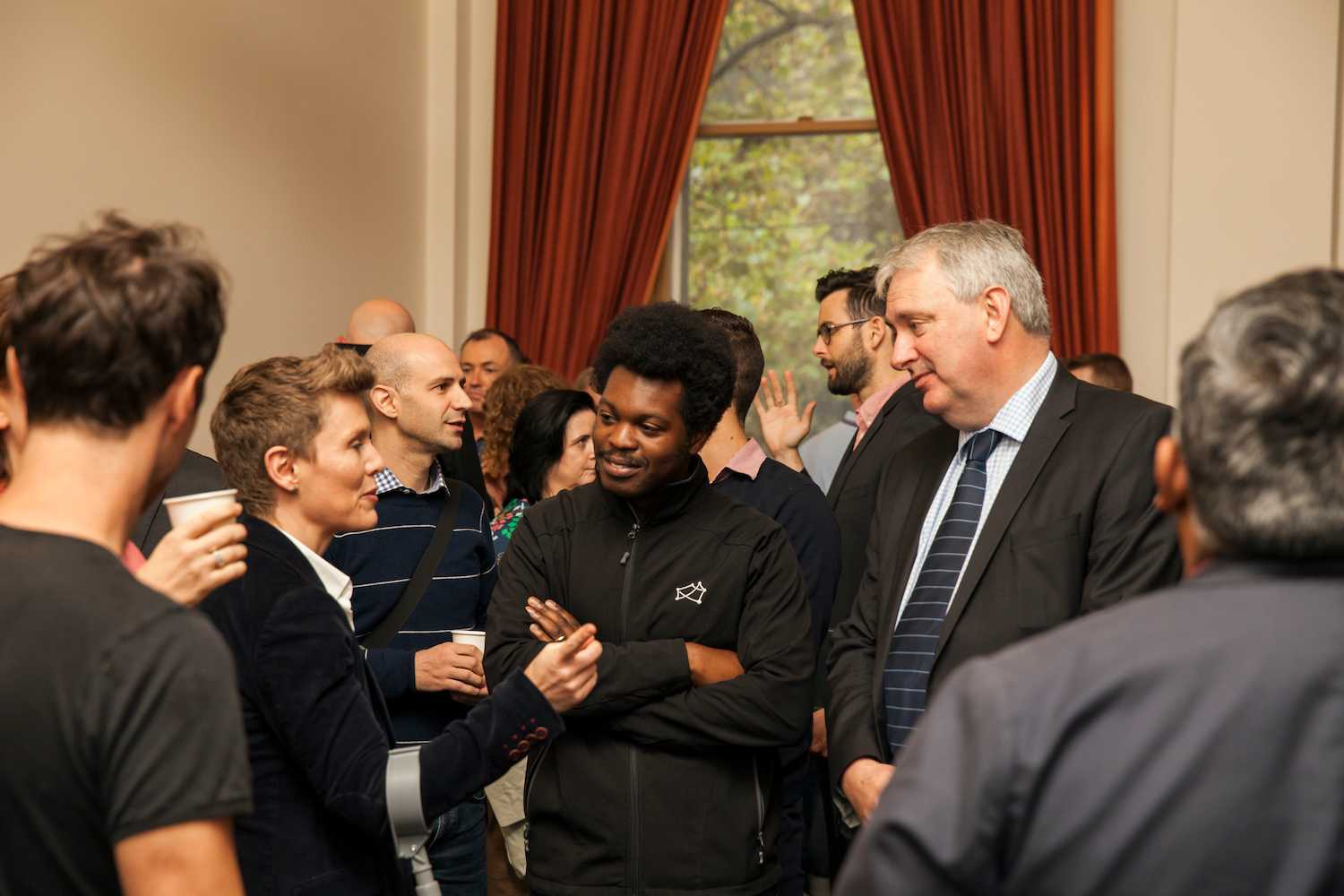10 takeaways from our 'Digital Capability Building in the Public Sector' panel
11 September 2022
We recently launched Future Practice, our new suite of educational offerings. As part of the launch event, we hosted a panel on 'Digital Capability Building in the Public Sector'. Here are 10 takeaways from our panellists.
Our digital government and public sector experts tackled the topic of digital capability building in the Australian public sector - what we're currently missing, why it's vital, and what's next for the public servants in this space.
Our panellists included Sharni Allen - Former Director of NSW Design System; Petrhyce Donovan - Digital Innovation & Smart Cities Expert; and Matt Sawkill - Managing Director of Code for Australia.
To view a recording of the event, head here.
#1 It's about people, not tech
"The thing that I like to remind people when they're working on on digital for the first time is that none of these concepts are new at all. We do what we're doing government for a purpose. And digital is a new way or a new medium that we may not have used in the past to be able to deliver for those needs. But fundamentally, at the core, those services remain the same. It's just that the way that we're delivering those services now change." - Petrhyce Donovan
"We can throw as much tech as we want as the problem at the problem. But if the people in government are resistant to changing their way of working or changing legacy technologies, then we really need to bring those people on the journey and ensure that they're being upskilled on Human-centred Design and service design and, and new ways of working, which is not necessarily anything to do with digital." - Sharni Allen
#2 We need senior leaders on board
"From my experience within government, you'll have plenty of practitioners from the ground up, who are really willing and wanting to embrace new ways of working, it's getting the endorsement of the senior leaders that's vital. With COVID we saw two different types of digital teams: one was ready and willing to embrace any new digital changes that will help us deliver these new things to the customer much faster; the second said "now is not the time for us to be changing our ways of working, because we're under such so much pressure". Getting that that leadership endorsement from the top down to demonstrate the effectiveness of those ways of working benefits the teams, but also benefits to the customer." - SA
#3 On how to get senior leaders on board
"Senior leaders in government want to look good. So if you can demonstrate that they're gonna look really great in front of the MPs or the minister, then they'll be on board." - SA
"People like saving money - everybody speaks currency. It's a little bit difficult to sometimes conceptualise how much money these digital projects are going to save, or the efficiencies that are going to be gained. But I always like to, as much as possible, put dollar figure to it, even if I'm creating some formula." - PD
"You need to have tech people and policy people and regulatory people in the room having these conversations. You can't jam on it via a tender process"
#4 Digital in the public sector has changed rapidly since COVID
"If you look at the digital products and service that we were delivering prior to COVID, they were they were fairly, you know, high level targeted towards people who are probably on the higher end of the digital literacy. But with COVID, we've had to change who the customer is. And we've had to then really deep dive a lot more into the accessibility space and understanding what those unique challenges are in order to be able to deliver those digital products and services in a in an integrated capacity." - SA
#5 Procurement needs to change
"We need to make the procurement process much, much faster. You might get funding and it might take you six months before you end up procuring something in which case, you've missed the boat." - SA
"We need to think about challenge base procurement. The United States does a really great job of going to industry with the challenge saying, "come back with a pitch" and then they buy based on those pitches rather than our very traditional old school style of requirements and procurement. - PD
#6 Teams need to be enabled to share their learnings
"I've been engaged in conversations with different teams building the same thing at the same time. So, how about we don't build two separate systems but rather we help build the same system? But there is at the moment, no single place in New South Wales government with a digital projects register, and I think that that would go a long way with helping identify opportunities that can be delivered in a collaborative way. There's a lot of silos that we need to break down." - SA
"We can all recognise that wherever you are in the world, you're always going to need to update your driver's licence, or you're going to need to get a birth certificate, or everyone needs to file their taxes. And obviously, the the outcome of that for everyone is exactly the same. We should be sharing our learnings with other agencies and internationally so we're all coming to a greater outcome for humanity. That's the great thing about working in the public service is that everyone wants just the best outcome for the customer. If we can break down some of those barriers and those silos locally and internationally, then that would be great." - SA

#7 Give existing public servants the opportunity to learn about digital
"There's got to be that opportunity for people to get involved in a programme of delivery, build up their skills, and then through that they become champions and it trickles on throughout the organisation and throughout the industry as well." - PD
"We're never going to be able to meet the demand currently for digital talent so we need to upskill as much as possible. Some of the best digital people in the world do not come from digital backgrounds. They come from subject matter expertise backgrounds, where they've learned to do digital. The answer to the question "how do we get more talent?" is we create it - we invest in existing talent." - PD
#8 Provide people with a safe space to ask "stupid questions"
"I've put subject matter experts who know nothing about technology, and tech experts through programmes like Tech for Non Tech, and I can't tell you how valuable something like that is to get every single person on the same page. Giving people space to people to ask the "stupid questions" is vital. A finance person might feel a little bit silly asking questions about APIs in front of someone that's a technologist. Plus a technologist speaks to robots and they just don't know necessarily how to how to explain that to a finance person all that well." - PD
"Enabling people, practitioners and teams to share their work and their learnings is key. The more of that stuff happens, you know, not behind closed doors, the better." - Matt Sawkill
#9 Public Sector salary bands don't work well for digital people
"The typical salary band is a four year bracket before you move up into the next pay scale. But in digital, skills move much faster than that. So in order for people to move up into another pay band, they have to go find another role somewhere else. So they're job hopping every one or two years as their upskilling, and that's why it's very difficult to retain them. If there's some sort of new framework around being able to compensate people based off their skills, rather than their time time in service, that would help." - SA
#10 We need to change the ecosystem to find and retain digital talent
"There has been some research done with the Department of Customer Service around why we're having such trouble retaining digital talent. It's not about the money, it's about the ecosystem in which these people hired into. We need to build a resilient ecosystem where digital people can actually thrive.
People often get bought into government and there's no support or mentoring services for them. They're often working under a leader, who may not be digital so they don't know where to go in order to find like minded people like themselves. People like to share and leverage learnings and talk about what they're doing with their peers. We need to build guilds and communities, so people who are coming into government feel supported and can feel like they're just part of a single ecosystem." - SA
"I don't think that we can talk about fixing the issue of digital talent without talking about burnout. Often in local councils, there are only a handful of digital people carrying the weight of digital capability uplift across an organisation of say, 1500 people. When you're working in transformation, you're breaking walls down every single day so you're gonna burn out much quicker. The onus is then on leadership to be able to go to battle for those digital people as much as possible, and support them as much as possible." - PD
"Lack of mobility is a big issue. We need to give people inside government the ability to shift around and get exposed to different things and have digital people that can flip between teams and share the knowledge." - MS
Our three educational offerings that each play a role in increasing digital capability.
